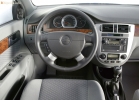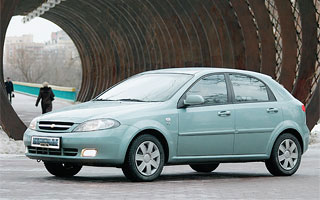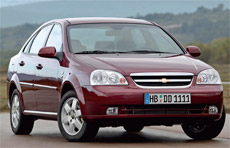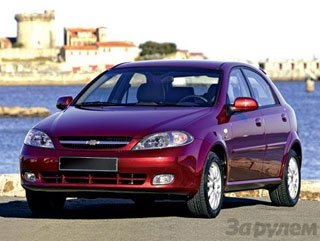CHEVROLET LACETTI sedan test drive since 2004 sedan
Meeting of classmates
 Cars that we choose
Cars that we choose Ten years ago, they graduated from school and now met again. Learning, memories ... How are you? Where are you now? Gradually, the overall feast passed to the level of microgroups. In one of them, five such dissimilar people with burning eyes are trying to tell each other something. All of them recently bought cars. Of course, cars similar to their owners. So, get acquainted: Jeanne, Igor, Boris, Vladimir, Arkady. Or: Toyota auris, Kia Ceed, Hyundai Elantra, Chevrolet Lacetti, Nissan Tiida.
Chevrolet Lacetti
Price from 541 030 rub.
Max. Power 121 hp
Acceleration 0100 km/h 10.7 s
Kia Ceedd
Price from 513 400 rubles.
Max. Power 122 hp
Acceleration 0100 km/h 11.4 s
Hyundai Elantra
Price from 684 900 rub.
Max. Power 143 hp
Acceleration 0100 km/h 10.1 s
Nissan Tiida
Price from 530 900 rub.
Max. Power 110 hp
Acceleration 0100 km/h 11.7 s
Toyota auris
Price from 595,000 rubles.
Max. Power 124 hp
Acceleration 0100 km/h 12.1 s
SUMMARY
Nissan Tiida and Kia Ceed came to the finish of the nostril in the nostril, but Tiida a little
lost due to rough finishes and revolutionary design, so victory,
oddly enough, Korean Kia Ceed gets. Toyota auris firmly settled in third place, a robotic box and an uninformative brake pedal drive prevented it above. The fourth place for Chevrolet Lacetti is an honest car for its money, and in terms of the amount of a car to the invested ruble, and a leader is completely. Fifth place is the Hyundai Elantra, non -informative steering, a rolling suspension, but the mainly unjustifiably high price is 685 thousand rubles. ($ 27.5 thousand) made it an outsider
1 PLACE
Kia Ceed
Pros: decent dynamics
Energy -intensive suspension
Good sound insulation
Decent controllability
Cons: not the most prestigious brand
2ND PLACE
Nissan Tiida
Pros: decent dynamics and handling
Energy -intensive suspension
Extraordinary appearance
Cons: shortcomings in the decoration
Extraordinary appearance
3RD PLACE
Toyota auris
Pros: Build quality
The prestigious image of the brand
Great sound insulation
Decent manageability
Cons: Robot
Uninformative brake pedal
4th place
Chevrolet Lacetti
Pros: Leader in terms of the price-robbery of the car
A painful engine
Cross Chevrolet
Cons: conservative design
Still not quite Chevrolet
5th place
Hyundai Elantra
Pros: good sound insulation
Painty engine Wall suspension
Cons: Non -informative steering wheel
Overcharge
HOW DO THEY LOOK
Nissan Tiida
The first show 2006
Design under the leadership of Shiro Nakamura (Shiro Nakamura)
Kia Ceed
The first show 2006
Design under the leadership of Peter Schreyer (Peter Schreyer)
Hyundai Elantra
The first show 2007
Design under the leadership of Thomas Burkle (Thomas Burkle)
Chevrolet Lacetti
The first show of 2004 2006. A new generation. Design GM DAT.
Toyota auris
The first show 2007
Design under the leadership of Vehei Hirai (Wahei Hirai)
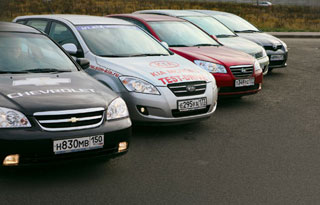 OUTSIDE
OUTSIDE Based on the results of this test, you can finally decide on the choice between a three-bobbed sedan and a bicobrobular hatchback in the Class C. Among rational hatchbacks, Kia leads a significant margin. Replacing the chief designer with Peter Schreyer, who at one time Audi TT brought natural results. CEED is the most concise and expressive in everything: in form, and in lines, and details. Toyota designers seemed to make a remake on the topic of KIA a similarity in everything. True, it is not known who first started, but the design of the Korean car makes the impression of the pristine. Sedans are fighting mainly for the integrity of the silhouette, for the alteration of the basic hatchback to the three -bobbyer a priori implies these compositional problems. Elantra looks most convincing, although the efforts in part of the integrity affected the facelessness of the image as a whole, which consists of wave-like lines and surfaces, which through the efforts of stylists are turned into some dead swell. Lacceti designers, as if justifying over the golden cross of the Chevrolet emblem, do everything on the cladding so that a small sedan is like a large American car. I was especially on the side. The design of Nissan Tiida looks unexpectedly sluggish. And this despite the fact that there are plenty of fashionable details in it: the hood towering above the wings, two floors of air intakes ... The only thing that invigorates is the drawing of the front emblem and mischievous headlights.
INSIDE
Natural borrowings from the style of much larger and richly equipped cars are natural. The compact class C, and even with the trunk ... For example, it is not surprising that the rudders of all participants in the sporting three-spoke, the interiors have rich color fiber cards, and silver metal determines the image. But the rear double sofas of sedan, by and large, will be cunning, attracting the third passenger. And, for example, Elantra gives the impression of a good business class, and even uses a fashionable wave type in the architecture of the instrument panels. In the category, the hatchback leads the interior KIA, the color factory of which inspires energy and enthusiasm, declared outside. Graving the same image, Toyota designers obviously overdid it, and the architecture of the instrument panel turned out to be a good addition to a dynamic relatives or compartment. Take a look at the rocket console, but what a beautiful door upholstery!
SUMMARY
Thanks to the efforts of attracted European and American designers, Korean brands have leveled out and pulled up. They even close their more experienced Japanese colleagues. After a couple of years, this picture will be complemented by China.
Text Max Sergeev photo Alexander Nozdrin
Source: Cars
Video test drives Chevrolet Lacetti Sedan since 2004
CHEVROLET LACETTI sedan tests since 2004
CHEVROLET LACETTI sedan since 2004
Chevrolet Laceti malfunctions: Detailed information| Lacetti sedan since 2004 | |
|---|---|
| Engine |  |
| Transmission |  |
| Control system and suspension |  |
| Brake system |  |
| Air heating and air conditioning |  |
| Launch and charging system |  |
| Electric components and so on |  |
| Corrosion body stability |  |

